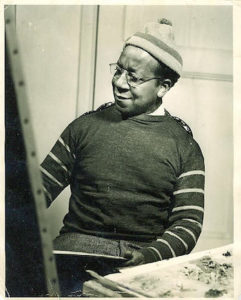
Beauford Delaney, 1950
*On this date, in 1901, Beauford Delaney was born. He was a Black artist.
His brother Joseph, who was also a painter, was from Knoxville, Tennessee. His parents named him Beauford for the coastal town of Beauford, South Carolina, where they had come from. Early in life, he showed skill in drawing, and he studied at the Massachusetts Normal School, the South Boston School of Art, and the Copley Society. Delaney moved to New York during the Harlem Renaissance, gaining a reputation as a pastel portraitist. Some of his works were exhibited at the Whitney Studio Gallery in 1930.
Delaney lived an unsettling life as an artist and constantly needed money to continue his work and studies. His commanding high spirit and charm attracted friends and patrons willing to support his free spirit as an expressive artist; he managed to meet, sketch, or paint many celebrities. By 1929, with the Harlem Renaissance in full bloom, Delaney got to know Countee Cullen, W.E.B. Dubois, Louis Armstrong, Duke Ellington, Ethel Waters, Henry Miller, James Baldwin, and others.
He worked as part of the Harlem Artists Guild and at Charles Alston's studio. It was in Greenwich Village where he got to feel totally at home, and during the 1950s.; he reached Paris with a friend's help. Delaney lived and worked in Paris for many years, and much of his work was neglected until a retrospective in 1978 at the Studio Museum in Harlem. During his absence to collect delinquent accounts, the French government sealed off his apartment and prepared to auction off his products of nearly a forty-year career. Had the works been sold and dispersed throughout Europe, the neglect may have been irreversible.
Many considered him the "Dean of African American Artists Living in Europe." Although he never fully wanted this distinction, most of Delaney's works were close to being classified as abstract art. Beauford Delaney died in Paris at age 78 from alcoholism and Alzheimer's disease on March 26, 1979.
The St. James Guide to Black Artist
Edited by Thomas Riggs
Copyright 1997, St. James Press, Detroit, MI
ISBN 1-55862-220-9